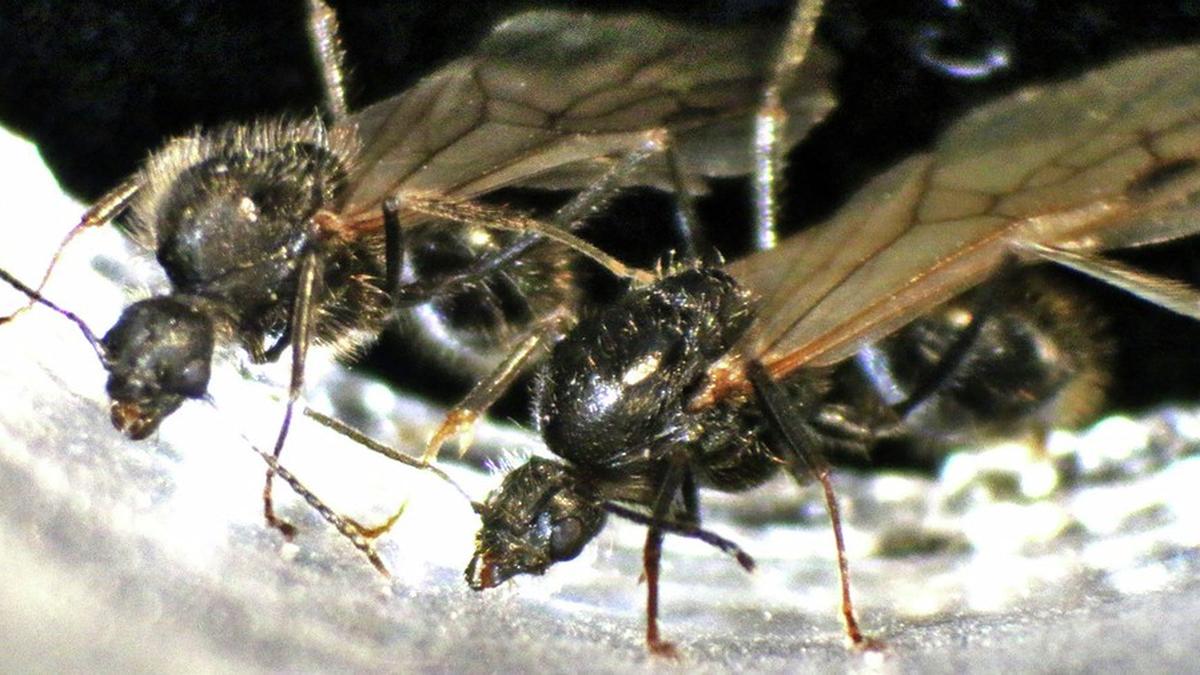Science
Ant Queens Defy Nature, Produce Sons from Two Species

Researchers from the University of Montpellier in France have uncovered an astonishing phenomenon in the world of ants. According to a study published in the journal Nature, queens of the ant species Messor ibericus are capable of producing male offspring belonging to two different species: their own, M. ibericus, and Messor structor. This discovery challenges traditional understandings of ant reproduction and raises intriguing questions about genetic inheritance in these insects.
The study reveals that the biological sex of ants is determined by their chromosomal configuration. Male ants, known as drones, develop from unfertilized eggs, while female ants—including queens and workers—develop from fertilized eggs. In the case of M. ibericus queens, they mate with both M. ibericus and M. structor drones. The fertilized eggs from M. ibericus sperm develop into queens, while those fertilized by M. structor sperm result in hybrid offspring that become workers. Unfertilized eggs develop into M. ibericus drones.
The researchers, led by D.P. Kasbekar, sought to understand how M. ibericus queens could produce drones of M. structor. They discovered that these queens eliminate their chromosomes from certain eggs before or after fertilization. When fertilized by M. structor sperm, these eggs contain only one set of chromosomes, leading to the development of M. structor drones. This mechanism is crucial for the survival of the colony, as these drones are necessary for generating workers in subsequent generations.
A surprising aspect of the research is that all M. structor drones produced by M. ibericus colonies are genetically identical, indicating a form of cloning. This suggests that ants may have developed cloning capabilities long before humans. The study marks the first instance of an ant colony producing drones of a different species, highlighting a unique evolutionary strategy.
The researchers propose that through the production of M. structor drones, M. ibericus queens gain significant advantages. This hybridization allows them to maintain genetic diversity and produce sterile workers necessary for the colony’s survival. The findings also explain the presence of M. ibericus workers in regions of Spain, Portugal, and Greece, while all M. structor individuals are males.
To support their conclusions, the researchers analyzed mitochondrial DNA. They found that M. structor drones from M. ibericus colonies displayed M. ibericus mitochondrial DNA, while their nuclear DNA was derived from M. structor. This finding underscores the maternal inheritance of mitochondria, as they are passed down exclusively through the egg.
The implications of this research extend beyond mere curiosity. It raises questions about the classification of these domesticated males. The genetic isolation of the M. structor drones suggests they may warrant designation as a distinct species. The researchers argue that this phenomenon mirrors the endosymbiotic relationships of organelles within cells, with clonal males representing a superorganism-level replication strategy.
This groundbreaking study not only sheds light on the complexities of ant reproduction but also invites further exploration into the intricate relationships within ant colonies. The findings suggest that M. ibericus can replenish its genetic stock by mating with wild M. structor drones, allowing the colony to eliminate undesirable mutations. As research continues, the fascinating world of ants promises to reveal even more surprises.
-

 World4 months ago
World4 months agoSBI Announces QIP Floor Price at ₹811.05 Per Share
-

 Lifestyle4 months ago
Lifestyle4 months agoCept Unveils ₹3.1 Crore Urban Mobility Plan for Sustainable Growth
-

 Science3 months ago
Science3 months agoNew Blood Group Discovered in South Indian Woman at Rotary Centre
-

 World4 months ago
World4 months agoTorrential Rains Cause Flash Flooding in New York and New Jersey
-

 Sports3 months ago
Sports3 months agoBroad Advocates for Bowling Change Ahead of Final Test Against India
-

 Top Stories4 months ago
Top Stories4 months agoKonkani Cultural Organisation to Host Pearl Jubilee in Abu Dhabi
-

 Science4 months ago
Science4 months agoNothing Headphone 1 Review: A Bold Contender in Audio Design
-

 Top Stories4 months ago
Top Stories4 months agoAir India Crash Investigation Highlights Boeing Fuel Switch Concerns
-

 Sports3 months ago
Sports3 months agoCristian Totti Retires at 19: Pressure of Fame Takes Toll
-

 Business4 months ago
Business4 months agoIndian Stock Market Rebounds: Sensex and Nifty Rise After Four-Day Decline
-

 Politics4 months ago
Politics4 months agoAbandoned Doberman Finds New Home After Journey to Prague
-

 Top Stories4 months ago
Top Stories4 months agoPatna Bank Manager Abhishek Varun Found Dead in Well









